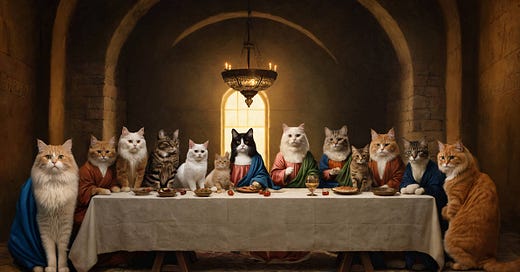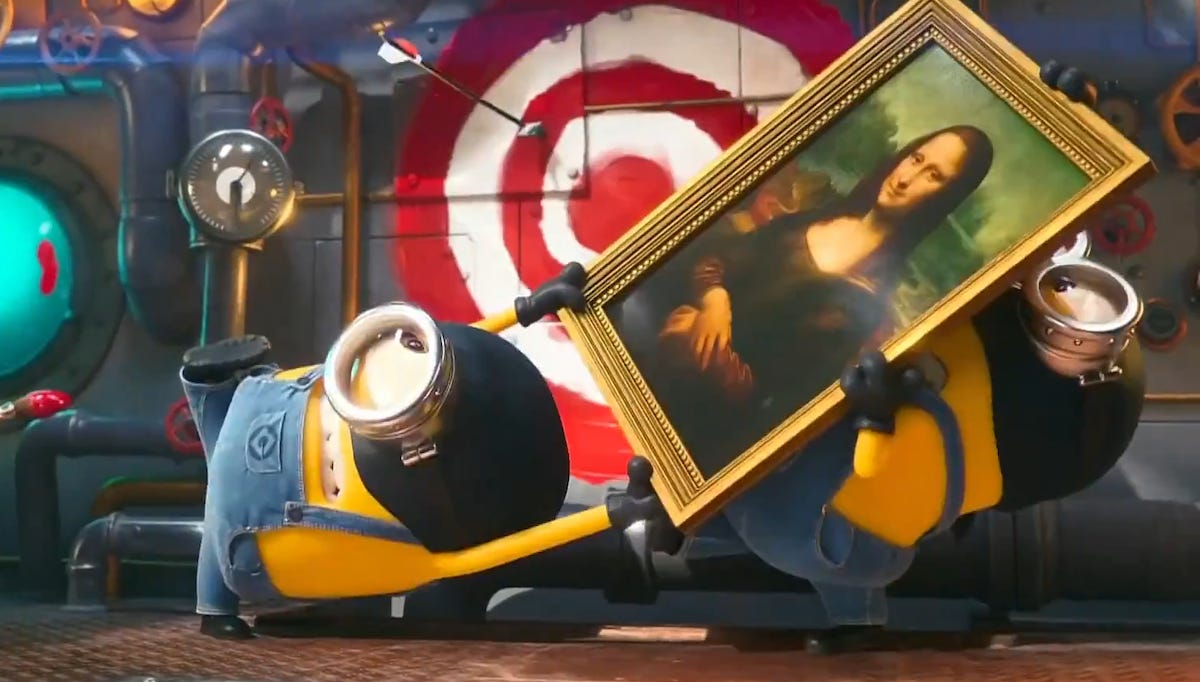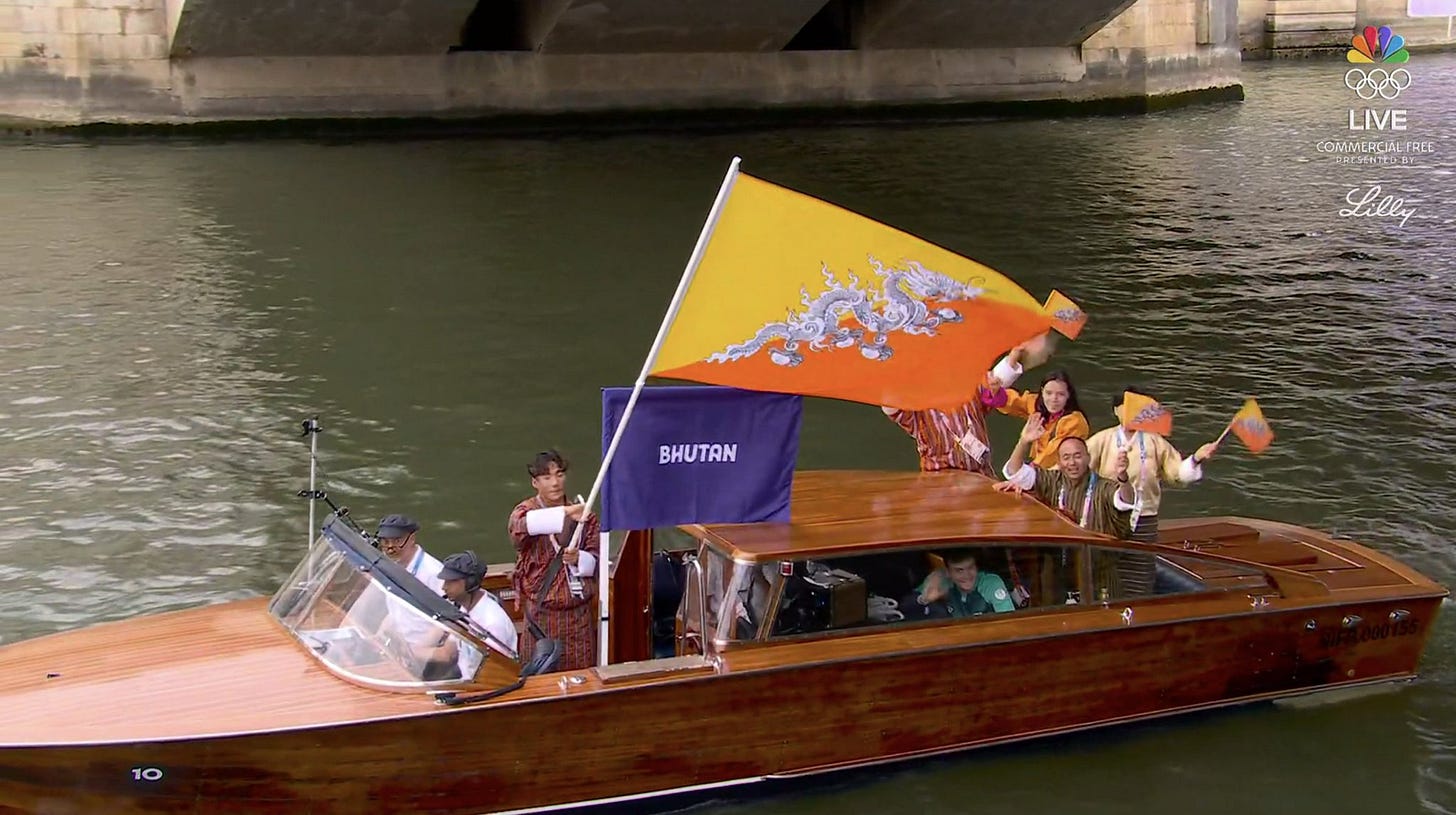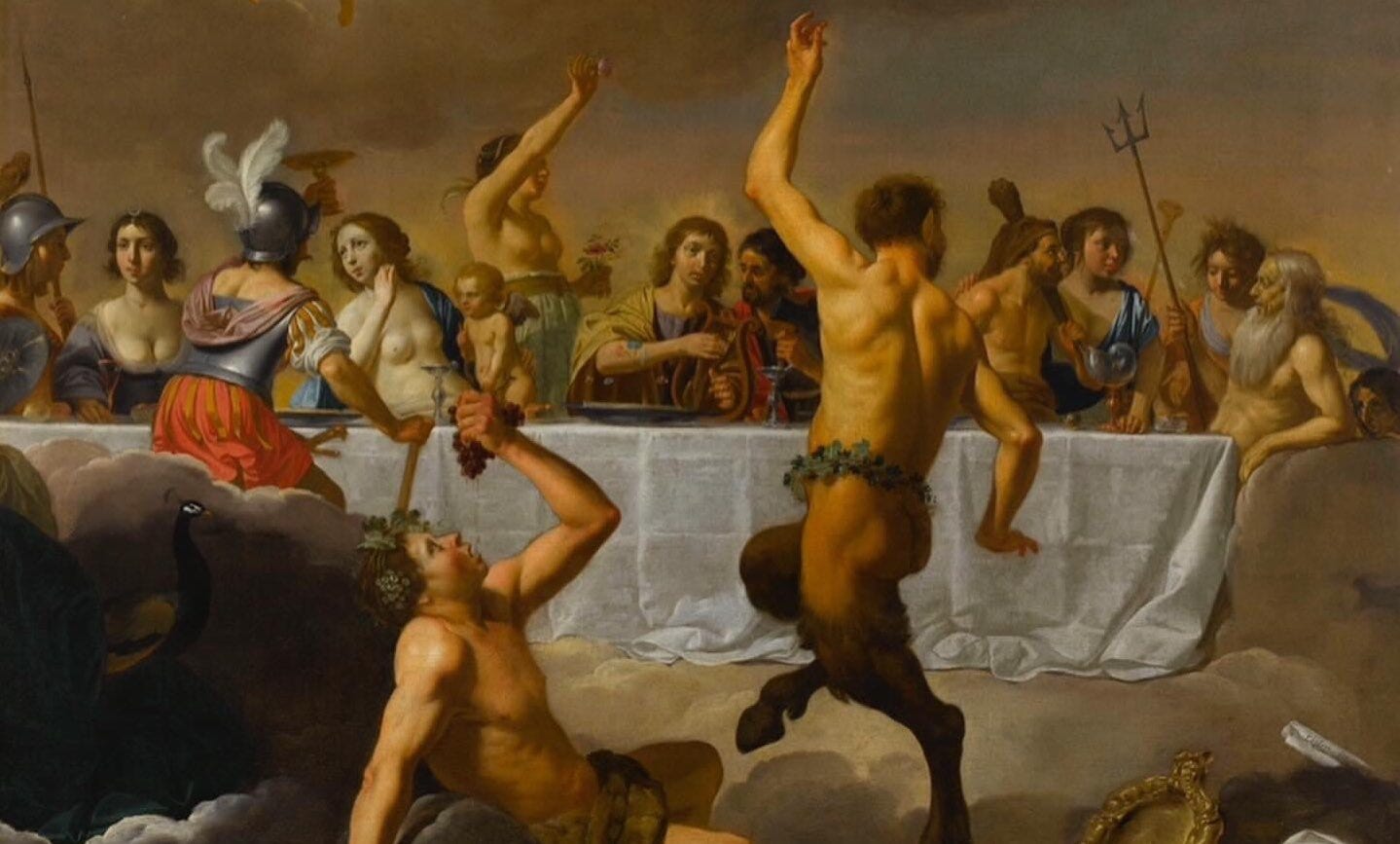Christians (and people who aren’t Christian but see Christianity as the key to preserving western civilization) are having a bit of a moment about The Olympics right now.
I know that not everyone necessarily needs to be sharing their opinions about everything all of the time, and indeed, it’s probably reasonable to say that I’m taking the bait by writing about culture war nonsense like this in the first place—but as a Christian myself, I couldn’t help but see the last few days as an internal family dispute. It’s not really the minutia of the opening ceremony at The Olympics that made me want to write about it, anyway—it’s what this conversation says about my faith community in a broader sense. And if Christians are my family, I can only speak to them with an attempted balance of love and honesty.
Okay, so here’s the short version: The Olympics Opening Ceremony in Paris was perceived to be “mocking” Christianity because it included imagery that some people interpreted as paralleling The Last Supper, featuring various French fashion models (and some drag queens) in the supposed roles of the disciples at the table. Since then, chaos has ensued online—and a little bit in real life.
My first reaction to this controversy was pure bewilderment at the fact that so many other crazy things about the Opening Ceremonies were being totally ignored—which makes me think most people didn’t even watch the full ceremony at all! My family and I spent four hours trying to guess the identity of that mysterious masked parkour-loving torchbearer and it was simply never revealed! Was it meant to be an Assassin’s Creed reference? We’ll never know. The Minions from Despicable Me showed up (apparently they’re French?!) and literally stole the Mona Lisa and threw it into The Seine—and it was never retrieved! Those little yellow devils are still on the loose, poor Mona Lisa probably has e. coli, and we’re all busy talking about runway models! Prosecute The Minions!
Granted, some people have been condemning other portions of the ceremony too; a few commentators, for instance, have said that the (extremely cool) French Revolution section with a beheaded Marie Antoinette singing heavy metal was actually “satanic.” Elon Musk called the section “incredibly disrespectful to Christians,” and I’m genuinely not sure what he means—but then, that’s nothing new. And then there are the folks who believe that the armor-clad Joan-of-Arc-looking flagbearer on the metallic river horse is actually the “single rider on a pale horse” from The Book of Revelation! Yeah, like, the real one. The end times are now and they’re happening in Paris, baby. Are we really going back to 90s Satanic Panic again? Is rock & roll the gateway to hell? Reports are inconclusive. Plus, there are all the wonderful things we’ve all decided to ignore; a truly rousing French national anthem performance! Celine Dion shocking everyone with a beautiful rendition of ‘L'Hymne à l'Amour’ despite her health condition! The references to early French cinema and the filmography of George Méliès! That boat with the Olympians from Bhutan, which was easily the most badass boat/flag combination of the night!
But I digress; let’s get back to the (apparent) Last Supper War. I’ll try to fast-forward through the background so we can just talk.
The backlash to the supposed “attack” against Christians during the ceremony has been pretty substantial, at least by chronically online standards. American conservatives quickly had strong words; Speaker of The House Mike Johnson said on Twitter, “Last night’s mockery of the Last Supper was shocking and insulting to Christian people around the world who watched the opening ceremony of the Olympic Games.” His tweet was just one of many voices quickly jumping to offense; in the days that have followed, Donald Trump Jr. has called the event “satanic,” Piers Morgan said it was a “drag queen mockery of The Last Supper,” and even the French Bishops’ Conference called it a “mockery of Christianity, which we deeply deplore.” Dallas Jenkins, the creator of The Chosen, posted a photo of the show’s supposedly more-faithful depiction of The Last Supper on his Instagram; many of the comments were quick to say things like, “this is much better than the heresy we saw on Friday!” Some people have even been sharing and resharing a video of a huge crowd of Christians supposedly demonstrating in Paris as a protest of the ceremony—but that has since been completely debunked.
Most of the models present in the runway sequence have faced nonstop online harassment since the ceremony aired—especially the woman at the center of the image, who said yesterday that she’s received countless sadistic threats of death and torture. Remember, she wasn’t even a drag queen; her great sin was being plus-size and female!
It would be pretty unfortunate (and embarrassing) if people expended all of this energy when the intention of the event had nothing to do with Christianity, wouldn’t it?
Okay, so, fact check time: the backlash got so substantial that The Olympics Opening Ceremony organizer came out yesterday and publicly apologized. More importantly, though, he confirmed what many people had already speculated: that the sequence was not meant to imitate The Last Supper at all, but was actually a modern interpretation of The Feast of Dionysus from Greek mythology. Historians on social media had already been pointing it out ever since the moment the event aired; while the imagery could appear adjacent to that of The Last Supper, it looked closer to an oft-imitated Renaissance painting archetype called ‘The Feast of The Gods.’ The Musée Magnin in France posted a photo of the painting with the caption “does this painting remind you of something?” and a wink. In his statement, the organizer said, “The idea was to have a pagan celebration connected to the gods of Olympus. You will never find in me a desire to mock and denigrate anyone.”
In hindsight, this was all a little obvious: the scene prominently featured a blue guy covered in grapes and literally dressed like Dionysus in the middle of the table. The Olympics originate in Greek culture. It makes sense! Even The Olympics Twitter account pointed out the meaning during the live airing.
And the irony runs deeper: the reason that people (understandably) saw some parallels to the imagery of The Last Supper is likely because so much of Christian Renaissance art was taking cues from earlier pagan Greco-Roman iconography; the whole “deity at the center of a table with a halo around his head” thing was hardly pioneered by Da Vinci with the figure of Christ. He was stepping into a visual tradition that existed already and bringing Christ into it. If you’re really interested in that historical rabbit-trail, beloved Disney Imagineer Joe Rohde did a fascinating Instagram post about the history of the “Feast of the Gods” archetype across visual art throughout the centuries. He says, “it’s hard to tell without looking at details which feasts are which. As it should be, because they are quoting each other visually. Let us recall that when Christianity began to grow it had no symbols to explain itself to a mainly Graeco-Roman population. So it borrowed tons of ideas, including the basilica shape of most churches, certain rituals, priestly dress, lots of art motifs, even comparative metaphors from pagan deities, reclaimed to mean something new. When the Renaissance came around, people got really interested in the origin stories of these symbols, thus, lots of Feast of the Gods paintings.” I don’t think “this was done before Da Vinci” is exactly the appropriative “gotcha” that some people might say that it is—but it does make this into a real “context is everything” situation where some humility might have helped.
If I’ve got any real problems with the sequence, it’s just that it’s visually kinda tacky. The décor feels haphazard and a little cheap. If you’re gonna go for Ancient Greek opulence, you’ve gotta go a little harder and more lavish than grapes and blue face paint. But I must admit, I do not find tackiness offensive—just annoying.
Here’s where I really want to talk more about the Christian reaction, though. Let’s say, for the sake of argument, that this was a modern interpretation of The Last Supper. Some people claim that despite their explanation, the organizers clearly intended the image to resemble it and they’re only obfuscating behind flimsy excuses. Even if that were true: what exactly would make it a “mockery” or a “jab” or an “attack” on Christianity, as many voices have suggested?
Da Vinci's Last Supper painting is one of the most iconic pieces of art in history. It’s been reimagined and reinterpreted hundreds of times to various effect; it doesn’t take more than a quick Google Image search to find The Simpsons parodying the image, a version with Donald Trump at the center, a Disney Last Supper, a Star Wars Last Supper, or basically any other combination you can possibly envision. More importantly: Da Vinci’s painting is not sacred canon. Is this painting not allowed to be referenced by people who are not Christian? What makes this (perceived) version an “attack” and not simply a “tribute”? Why can’t we allow a public reference to our faith to start conversations instead of hostility? As Myles Werntz noted on his Substack, “a parody only works if you know the original. It is literally the original that is called to mind by parodies. A parody, thus, can never be an offense, for it only works by reminding its audience of what it wants to obscure. Under the sign of a parody, the original is brought to mind, long after the messenger of the original has been forgotten.”
It seems to me that the reason people insist this particular tribute/parody is meant to be mean-spirited mockery lies in the specific people groups who are represented in the picture. If The Last Supper imagery had been recreated using a bunch of straight white Olympians, or children, or French mimes, I don’t think you’d see the same backlash today; it would probably be viewed as a fun visual reference, not an attack. It’s the fact that several of the people in the image are visibly queer that has made people interpret it as “mockery.” The very existence of these people in that context is viewed as an affront to God, taking sacred imagery and perverting it.
So, in essence, some people in my faith family are upset that the people group they perceive as “unclean” could ever conceivably be present at The Last Supper.
…yeah.
When you think about it for a second, this is really, really ironic. It’s exactly the pushback Jesus received when he spent time and sat at the table with prostitutes, tax collectors, lepers, gentiles, and women. The most derided outcasts were exactly the people present at The Last Supper. It’s easy enough to think we’d be able to embrace tax collectors or gentiles (like us) when we look at the Gospels with eyes unburdened by ancient prejudice—but what if Jesus showed up today and asked us to embrace the people we actually see as unclean? It’s a question that’s been asked again and again and it never stops being relevant.
I'll grant this: I can see that perhaps the undercurrent anxiety around this image stemmed from the feeling that "these people" were trying to make themselves gods—to not just sit at the table with Jesus, but to deify themselves instead. I can resonate with the opposition to that idea. If that were indeed the intention, it would have been worth interrogating—though the organizer’s statement seems to imply that he was more interested in a vision of a celebration, where many different people groups were represented and included. It stands to acknowledge, though, that The Olympics are sort-of bathed in a spirit of deification to begin with; the games are often about raising up our greatest athletes (or "Olympians") to near godlike status. It's just that we don't have a problem with doing it unless they have a specific identity we oppose.
In real “backlash to the backlash to the thing that’s just begun” fashion, some Christians have criticized other Christians within their communities for shrugging off attacks like this and refusing to get up-in-arms about something trivial. One Evangelical influencer claimed that the Christians who were not expressing rage about the ceremony were actually the “lukewarm believers” as referenced in Revelation. The idea, it seems, is that we need to voice our outrage and offense in the public square as forcefully as possible to keep the world on the right path and God in the proper position of reverence—otherwise, I guess, civilization is at stake, or something. The very fabric of God’s good creation depends on us being vocally Mad Online!
As if enough fringe voices hadn’t spoken out already, accused human-trafficker and dudebro influencer Andrew Tate recorded an angry 9-minute video speaking to the situation. Normally I wouldn’t even include the opinion of someone so unhinged, but I think it paints a pretty compelling picture of the completely paradoxical form of supposed Christianity being espoused in defense.
Brace yourselves. Tate said, “Are any of you [Christians] gonna do anything after the most blatant mocking, probably in history, of Jesus Christ?!”
Man. When you put it that way, I guess this does feel like a big deal! But wait; let’s think about this for a moment. I’m pretty sure the most blatant mocking in history of Jesus Christ was the crucifixion, no? Some distant runner-ups might be the The Alexamenos Graffito from 200AD, which depicts Christ crucified with the head of a donkey—or, ya know, the actual violent persecution of Christians throughout history. Or maybe Life of Brian! Either way, the whole “mocking Christ” thing…I’m pretty sure Christians have been there, done that, and things have worked out pretty well in the end given the bit about him being God.
As if it couldn’t get more ironic, Tate said in heated tones, “They wouldn’t dare do it to Judaism, they wouldn’t dare do it to Islam. They mock Christians because you’re endlessly weak, endlessly forgiving!”
He went on, growing increasingly aggressive: “Anger moves the world. And I think all of this trope about endless forgiveness and allowing yourselves to be mocked and taken advantage of forever is gonna backfire. There’s gonna be a point in the future, if the world still exists, where people will look back and say ‘what were the Christians doing to save Christian civilization during that period’? And when you find out the answer was forgiving…there’s gonna be a long history lecture about how they should have f*cking stood up and done something!”
What’s the opposite of a backhanded compliment? Because I’m pretty sure Tate tried to criticize the very essence of Christianity and only reinforced the completely subversive nature of faith and love in a world that usually doesn’t operate with them. I don’t think I’ve ever seen a more remarkably palpable misunderstanding of what Christianity is all about—all coming from a guy who is trying to defend it. Suddenly, you start to understand how some of the disciples could follow Jesus all the way to the end expecting a revolution and still missing the point entirely.
Christians themselves could always use a reminder that God does not need us to defend him, but it’s particularly telling that the most powerful voices claiming Christianity needs defending in our current moment aren’t even Christian to begin with. Elon Musk, a frequently professed atheist, tweeted on Saturday, “unless there is bravery to stand up for what is fair and right, Christianity will perish.” This sentiment from atheists has been on the rise recently, with even Richard Dawkins proclaiming himself a “cultural Christian” and saying that although God does not exist, the Christian basis of ethics must be maintained to preserve a decent society. Among them all, there is a sense in which we must aggressively fight to maintain this way of life—or it will be consumed by “woke” secularism and die forever.
When you view Christianity as a practical mechanism to reinforce your preferred values of western civilization but you don’t actually believe in God, this kind of sentiment makes complete sense. You’d hope, however, that people who do believe in God might have a different perspective.
If this triune God truly is who he says he is, he doesn’t need us to bring about his will on earth. We’re invited to play a part in it—but the transcendent and cosmic realities that undergird the fabric of the world he created aren’t going to be unraveled by drag queens on TV or teenagers posting memes online. I’d prefer to assume that they’re a little more solid than that! When people repeatedly comment the phrase “God will not be mocked,” you’d think it would be evident that this is a characteristic of God that will prove true in the end regardless of whether we try to make it true. “God will not be mocked” is not a call to arms, it’s an attribute of God. He cannot be mocked. The fact that God will not be mocked is not dependent on our ability to repudiate all mockery, or take out our sword and cut off our enemy’s ear. It is simply true. Christ did a pretty good job of proving he could take mockery for himself when he wore the crown of thorns.
On the topic of forgiveness, the guy who played Dionysus in the sequence had his own apology on TV yesterday—and he seems to understand Christianity a whole lot better than Andrew Tate or Elon Musk ever could: “There was never any question of religion or ‘The Last Supper.’ No, it was always about Dionysus. I’m deeply sorry if it shocked some people, because that wasn’t the intention at all. I was brought up as a Christian, and the best thing about Christianity is forgiveness. So I ask forgiveness if I have offended anyone, and the Christians around the world will grant me that I’m sure, and will understand that it was mostly a misunderstanding.”
So no, I don’t think the problem with Christians is that we’re too forgiving; it’s meaningful that some people would still be able to associate forgiveness as our defining trait, and if anything, we should be far more willing and eager to dish it out than we are. Our problem is that we’re too easily offended on behalf of a God that can take it.
If Christians are looking for something to genuinely direct their righteous anger toward, you’d think there might be some more compelling injustices going on in the world than a performance at The Olympics. Where was the outrage over Christianity being mocked when some of the most longstanding Christian communities in Gaza were being massacred by snipers and bombs provided by the US—and some of the earliest Christian religious sites were being blown to smithereens? Heck, what about the murder of Sonya Massey by police in her own home earlier this month, whose near-final words were “I rebuke you in the name of Jesus”? Or maybe the moral failures of “Christian” candidate Donald Trump? It feels like this is a little more worthy of pearl-clutching than something aired on network TV.
Outside of Christian conservative spheres on social media, the intense religious backlash to the Opening Ceremony has generated mockery and distaste for Christianity in ways that the image at the ceremony never could have conjured on its own. And honestly, fair enough. I’ve seen more than a few people bewildered that Christians could look at an event hosted by France, uniting hundreds of countries practicing thousands of religions, and assume that it all needs to cater to their preferences specifically. More than that: the sheer sense of hatred and anger toward LGBT people has been palpably felt—and it’s pretty far from a “they’ll know we’re Christians by our love” moment. It just seems obvious that this behavior is a much greater mark against us in the public eye than any silly re-enactment of a painting could ever be.
I’d say “God can defend himself,” but that would imply that he’s capable of taking damage from drag queens in the first place. What a silly world that would be.








I would like to slap Tate and Musk upside their heads with a copy of "The Patient Ferment of the Early Church." (Okay, GENTLY slap. In a very forgiving way because they are idiots who simply don't know better.) The Church has never been at risk from being too forgiving, it risks dying out when it becomes so entwined with culture that it loses its distinctive nature. And by 'entwined with culture' I don't mean in the sense that the culture warriors do, I mean in the sense of elevating power and wealth and seeing those as signs of our success as a faith.
Houston,
Your voice is so refreshing in contrast to the tumultous sea of outrage. Keep up the good work!